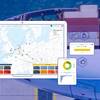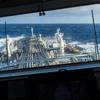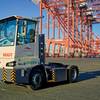GEA Equips Cruise Ships with Transcritical CO2
German manufacturer GEA has developed a new, transcritical CO2 technology especially for use on seagoing vessels.
GEA signed a contract last year with P&O Cruises, part of Carnival Corporation & PLC, the world's largest commercial cruise ship operator, for its new transcritical CO2 refrigeration technology.
The environmentally friendly refrigeration technology has already been installed on board the Arcadia, a 2,000-passenger ship from P&O Cruises, where it provides energy-efficient refrigeration for all the ship's food and beverage refrigeration systems.
Further orders for its transcritical CO2 refrigeration technology have now been received by GEA for two new cruise ships to be built in China and for a Dutch fishing trawler, the second largest in the world.
In May 2019, GEA signed a contract for transcritical CO2 refrigeration technology with Shanghai Waigaoqiao Shipbuilding (SWS), China. SWS is a subsidiary of China State Shipbuilding Corp (CSSC).
SWS is building the first two cruise ships ever built in China. They will work for the new Chinese brand CSSC Carnival Cruise Shipping Ltd., which is part of the world's largest commercial cruise company.
The agreement between GEA and SWS provides for the supply of energy-efficient refrigeration and freezing for all food and beverage refrigeration equipment on two cruise ships. The first 133,500 GT ship will be delivered in 2023.
"The cruise market is booming worldwide. In China alone, growth to 4.5 million Chinese cruise passengers is forecast by 2020. This will be the first newly built cruise ship to be equipped with this type of sustainable technology. This is a really important reference project and we believe it will lead to a major spin-off," says Marc Prinsen, GEA Head of Application Center Utilities Marine.
But not only the cruise industry relies on GEA's transcritical CO2 technology. Cooling systems are the backbone of every fishing ship, especially when it comes to fishing trawlers. And, of course, trawlers also have to comply with global environmental agreements.
The use of environmentally friendly, sustainable cooling systems with environmentally friendly CO2 is relatively new in the marine business as it is difficult to develop flexible CO2 cooling systems that can be safely installed in the confined and mobile environments of seagoing vessels.













